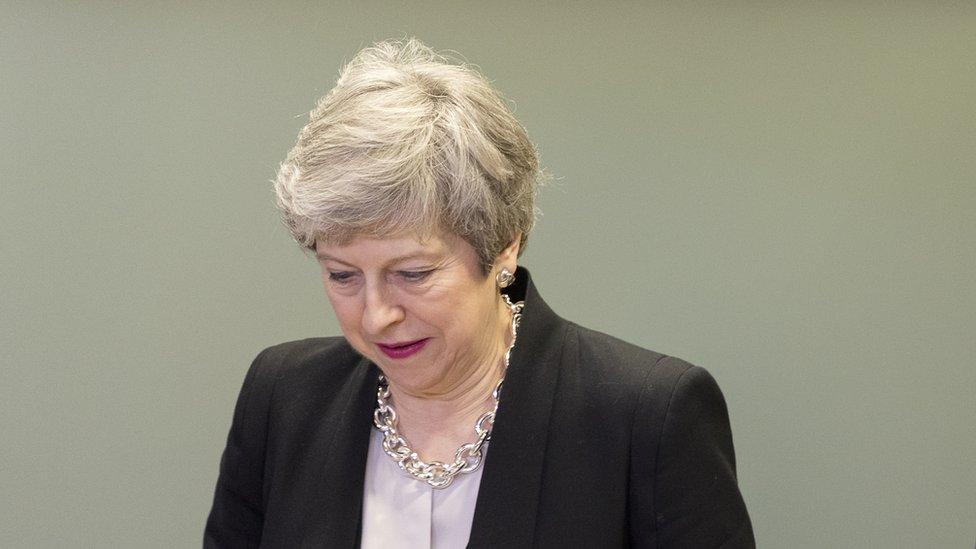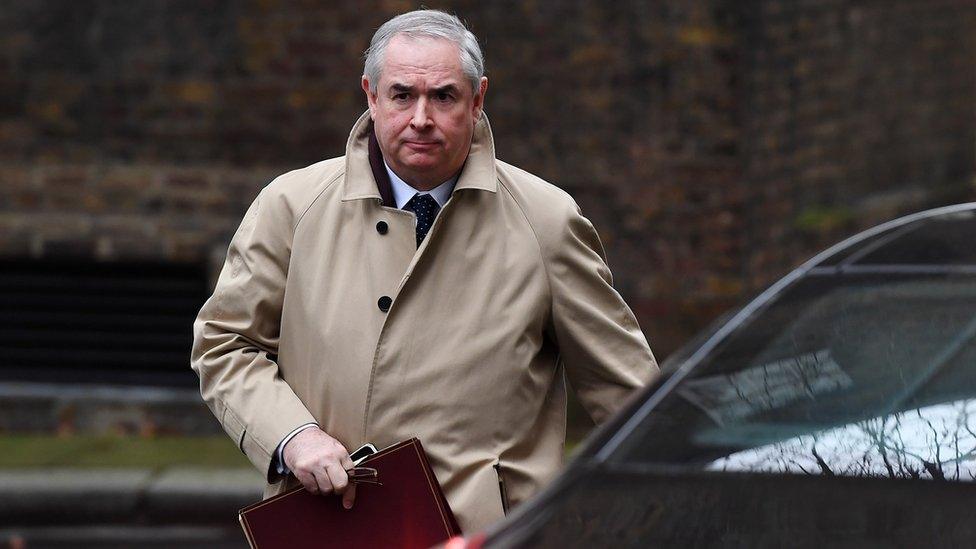Week ahead in Parliament
- Published

High Noon on Wednesday? Or another episode of Apocalypse Postponed?
At the moment, the timetable for the next round of Brexit battling in the Commons suggests the prime minister will update MPs on the current state of the negotiations on Tuesday, and if there is no agreement ready to be (meaningfully) voted upon, then the House will be given a chance to register its view on Wednesday.
This could be the moment when the fourth incarnation of the Yvette Cooper-Nick Boles-Oliver Letwin scheme, to allow MPs to seize control of Brexit policy, is enacted. Or maybe not.
There are quite a lot of imponderables here. First, maybe the UK and the EU teams might manage to work up a formula which give the guarantees the Commons sought on the non-permanence of the Irish border backstop plan.
In that event, they would have an agreement that could be put to the vote in the House, with a reasonable expectation of success. Perhaps Labour might be lured into supporting the deal, or at least abstaining, with a nod and a wink that a general election would follow, to allow the parties to seek a new mandate on the future relationship with the EU, after the two-year transition period, which is all the current deal actually provides.
For this to happen, the PM needs the benediction of Attorney General Geoffrey Cox - his assurance that whatever assurances have been worked out are indeed watertight are an absolute requirement for this chain of events to occur. And if the PM did win this vote - the so-called 'meaningful vote' - then expect the government to move very fast to bring in its legislative expression, the Withdrawal Agreement Bill, or WAB.
That's one possibility. But there are others. Suppose the prime minister cannot achieve a deal with any prospect of getting through the Commons - what then?
This may be where the Cooper-Letwin plan comes into play. They have prepared a plan which, if voted through on Wednesday, would give priority to a bill requiring the prime minister to do one of two things: either to seek Commons approval for a no-deal Brexit, or seek a postponement of Brexit Day, by extending the Article 50 negotiating period, while the UK decided what to do next.
'Massive constitutional rebuke'
So they would have to pass their paving amendment on the Wednesday, and then get the subsequent bill through all its Commons stages, probably on the Thursday, so that it could be sent off to their Lordships, probably before the weekend. This would require some pretty draconian timetabling, but they could simply cut and paste the details of the "guillotine motion" used on the recent Northern Ireland Executive Functions Bill, which was rammed through all its Commons stages of consideration in six hours flat.
This may all look very twiddly and procedural, but in reality it is a massive constitutional rebuke to the government. It crashes through more than a century of Commons precedent, breaking the government's stranglehold on the parliamentary agenda, and essentially seizing control of the central policy issue confronting the country from the hands of Theresa May and her ministers.
I can't help wondering if, having been subject to such a unique humiliation, the prime minister might simply resign. Resignations would certainly be involved if it did pass, because it would probably require government ministers to vote against the, er, government, for Cooper-Letwin to pass - and the May Government might simply then disintegrate.
One way of forestalling that would be for the prime minister to give the potential rebels what they want, and promise to hold a vote on Article 50 extension in the near future. A cast-iron assurance of that kind might disperse the accumulating head of steam behind Cooper-Letwin, but at the price of infuriating the Tories' Brexiteer wing. This is one of those situations where it is hard to please any of the people any of the time.
And then there's the other proposal doing the rounds, Kyle-Wilson, the idea of tying parliamentary approval of the May Deal to a referendum. This might evolve into a clear decision mechanism where voters were given the choice of the deal, or Remain - with the winner automatically being implemented, once the votes were counted. So either the UK would leave on the Theresa May terms, or the Article 50 notice, the legal notification of intent to leave the EU, would be rescinded. And who knows what further variations might appear before the likely deadline for amendments at the close of Commons business on Tuesday.
So there are some very big issues in play next week - and the strain they impose could mean more MPs resigning from their parties, maybe some peers too, and plenty of internal ructions amongst those who stay put. All of which makes the formal agenda for much of next week seem rather secondary to the unfolding events - and much of it may be swept away under some of the scenarios I have just outlined.
But, in any event, here's my rundown of the scheduled parliamentary business for the coming week:
Monday 25th February
The Commons opens at 2.30pm with Home Office Questions. The usual series of post-weekend ministerial statements and urgent questions will probably follow from 3.30pm. This might include Attorney General Geoffrey Cox giving his verdict on any new form of words regarding the Irish border backstop - which would be an important appetiser to debates later in the week.

Will Geoffrey Cox emerge as a key player in next week's Brexit drama?
When that is done, MPs turn to a couple of Brexit-related statutory instruments (SIs): the Draft Financial Services and Markets Act 2000 (Amendment) (EU Exit) Regulations 2019, which aim to ensure that the UK continues to have a functioning financial services regulatory regime in any Brexit scenario; then the Draft Reach Etc. (Amendment etc.) (EU Exit) Regulations 2019 - this is the Registration, Evaluation, Authorisation and Restriction of Chemicals framework brought in by the EU in 2006 and this order creates a UK regulatory system similar to the current EU system but under the UK Environment Secretary.
Then comes a backbench debate marking the twentieth anniversary of the Macpherson Report, the report of the inquiry into the murder of Stephen Lawrence which aimed to identify lessons to be learned for the investigation and prosecution of racially motivated crimes.
In Westminster Hall (4.30 pm) there's a debate on an e-petition, external calling for parents to have the right to opt their children out of relationship and sex education when it becomes mandatory in September 2020. It has attracted 104,981 signatures.
On the committee corridor there's a rather unusual event - a Second Reading Committee for the Children Act 1989 (Amendment) (Female Genital Mutilation) Bill [Lords] - 4.30 pm. This is the private member's bill from the House of Lords that was blocked from receiving a formal second reading by the Conservative MP Sir Christopher Chope on February 8th.
The bill, which makes a one-line amendment to the Children Act 1989, to allow the courts to impose an interim care order on a child is at serious risk of being subject to FGM, was pushed through the Lords by crossbench peer Lord Berkeley of Knighton. The government reacted to Sir Christopher's objection, which denied it a formal second reading, by allowing the bill to have a second reading debate in committee - an unusual procedure, last used on the previous bill he blocked, to ban 'upskirting'. The FGM Bill's promoter in the Commons is the Conservative Zac Goldsmith.
In the Lords (2.30 pm) peers have another day rattling through seven Brexit-related orders and regulations, covering such subjects as the Rules of the Court of Judicature (Northern Ireland), Money Market Funds , Uncertificated Securities, Securitisation, Aviation Security, Air Traffic Management and finally, the Maritime Transport Access to Trade and Cabotage (Revocation) (EU Exit) Regulations 2019 - this one has been targeted by uber-Remainer, Lord Adonis, who has put down a motion to decline to approve, complaining of an "egregious lack of consultation".
The order was flagged up as worthy of debate on the floor of the House by the influential Joint Committee on Statutory Instruments because of its possible impact on UK operators' ability to provide shipping services in the EU after Brexit. Peers have only rejected a handful of SIs in half a century, but Lord Adonis has been using these debates to highlight some of the impacts of leaving the EU. This week he was accused of "testing the patience of the House," peer-speak for time-wasting, but he shows no sign of abandoning his guerrilla attacks in this area.
Tuesday 26th February
MPs begin with Foreign Office Questions (11.30 am), and that is expected to be followed by the PM's promised update on Brexit (see above).
The day's ten minute rule bill, external from the Conservative Alan Mak is the National Health Service (Prohibition of Fax Machines and Pagers) Bill - Mr Mak is the author of a report which calls for the NHS to go paperless, abandoning outdated technologies like pagers and fax machines and moving to a fully digital service that will help patients take control of their treatment and save substantial amounts of money, which can then be reinvested in frontline services.
The main debates are two "Estimates Day" debates which will culminate in votes to authorise the estimates for the Department for Education and the Department for Work and Pensions. The precise subjects are now chosen by the Backbench Business Committee - on education, there are concerns about the fact that, while overall spending has risen, the funding per pupil has gone down, about the need for a funded 10-year plan for education to match the 10-year plan for NHS England and about working out how to pay for removing asbestos in school buildings. On the DWP estimates - the largest of any departmental budget - MPs want to discuss the 10 million claimants of current legacy benefits yet to move onto universal credit.
The adjournment debate, led by Labour's Dr Rosena Allin-Khan, is on safeguarding vulnerable adults in care homes.
In Westminster Hall debates include: the cost of unhealthy housing to the NHS (9.30am); global education for the most marginalised (2.30pm) and the former British child migrants payment scheme (4.30pm).
My committee picks are the Home Affairs hearing (10am) on English Channel migrant crossings, with witnesses including the Chief Constable of Kent and officials from the Maritime and Coastguard Agency.
Down the corridor, meanwhile, the Bank of England Governor Mark Carney will be quizzed by the Treasury Committee (10am) on the Bank's latest inflation reports.
In the Lords (2.30 pm), questions to ministers include one on strengthening controls over internet providers in the light of concerns over child bullying and suicide. Then peers turn to a series of private members' bills, starting with committee consideration of the Stalking Protection Bill - this is the bill from the former Conservative, turned Independent, Sarah Wollaston, which creates a new civil Stalking Protection Order. At the time of writing there are no amendments down for consideration, so this could be a rapid formality. Then comes the committee stage for the Parking (Code of Practice) Bill , where there is an amendment down toughening up the requirement for the government to appoint an independent person to hear appeals against parking fines imposed by car park operators.
The Organ Donation (Deemed Consent) Bill is down for its third reading - the final move towards setting up a system for England modelled on the one in Wales, based on opting out of organ donation rather than requiring people to opt in. Again, this looks like a rapid rubber-stamping exercise.
Peers then turn to Commons amendments to the Mental Capacity (Amendment) Bill, which deals with the human rights of some 2 million vulnerable people. There may well be more to and fro, because Labour continues to believe the bill is "not fit for purpose."
And finally, peers turn to the first day of report stage consideration of the Offensive Weapons Bill - there are plenty of amendments down, including a government one to create new knife crime prevention orders and interim knife crime prevention orders, Asbo-style orders designed to tackle knife violence in the UK, which the Home Secretary promised to introduce.
Wednesday 27th February
The Commons day opens (11.30 am) with half an hour of Welsh questions, followed at noon by Prime Minister's Question Time. There will be a brief non-Brexity interlude while the Labour MP Helen Hayes proposes her ten minute rule bill on Planning (Affordable Housing and Land Compensation) - she has a track record of seeking to reform the planning system for housing. And then MPs will rattle through the parliamentary rituals necessary to pass the Supply and Appropriation (Anticipation and Adjustments) (No. 2) Bill - which will sail through all its Commons stages in a mere blink of an eye.
Then they come to the week's mega-event, an amendable motion on the UK's withdrawal from the European Union. As discussed above, almost anything could happen here - and amendments in various causes will doubtless be circulating and evolving in the previous days. So watch out for whatever has been submitted by the deadline, the close of business on Tuesday, and is then selected for debate by the Speaker, John Bercow. As on previous days, there could be a long series of votes at the end, perhaps stretching over several hours.
In Westminster Hall, debates include Eating Disorders Awareness Week (9.30 am); the Future of the Department for International Development (2.30 pm); the role of unincorporated associations in electoral funding, and the rights and protections for residents of leisure park homes (4.30 pm).
My committee pick is the Digital, Culture, Media and Sport session on immersive and addictive technologies (2.30 pm) with witnesses from the National Problem Gambling Clinic and York St John University.

The committee wants to look into the impact of virtual reality technology
But one for Commons-watchers is the Procedure Committee's session (2.45 pm) on the power of the House of Commons to call for papers. Essentially this is about what limits there should be on MPs' right to see confidential government papers, and particularly legal advice or national security documents. This follows the successful use of the 'humble address' procedure to secure the release of the government's legal advice on the Northern Ireland backstop. A high-powered group of witnesses will give evidence, starting with the Leader of the Commons, Andrea Leadsom, Followed by the Attorney General Geoffrey Cox and the outgoing Clerk of the Commons Sir David Natzler.
In the Lords (3pm) questions include one on the threat to river ecosystems posed by farm chemicals, sewage and excessive abstraction, and then peers have their parallel debate on Brexit.
Thursday 28th February
The morning after the night before, MPs open (9.30 am) with Brexit questions, which might offer an opportunity to measure the fallout from whatever transpires on Wednesday. Then the Leader of the House of Commons, Andrea Leadsom, announces the new week's Commons business, which again might address the ramifications of whatever decisions MPs have taken.
The main debate is the (not quite) annual St David's Day debate on Welsh Affairs. That will be followed by a general debate on the UK's progress toward net-zero carbon emissions.

The EU says it wants go to 'climate neutral' by 2050
In Westminster Hall (1.30 pm) proceedings open with a select committee statement on a report from the Health and Social Care Committee on spending during the early years of a child's life - led by the Labour MP and GP, Dr Paul Williams.
That is followed by a debate on Carrier strike strategy and its contribution to UK defence - a look at how the UK's new aircraft carriers should be employed, and the underlying strategy for their use.
There's even a rare peep of Thursday activity on the committee corridor, as the Public Administration and Constitutional Affairs Committee quizzes the Cabinet Secretary and Head of the Civil Service Sir Mark Sedwill on his work (10 am).
In the Lords (11 am), questions to ministers will include one on the cost of theatre tickets in London - expect a few personal anecdotes from peers.
The main debates are on improving the safety of medicines and medical devices - led by the former Health Minister Lord O'Shaughnessy, and on the contribution to public safety made by the Dartmoor Search and Rescue Team and work carried out by other search and rescue services.
Friday 1st March
The Commons is not sitting, but in the Lords (10am) peers debate a series of private members' bills, starting with the second reading of the Animal Welfare (Service Animals) Bill - AKA Finn's Law - which will bring in tougher sentences for attacks on police dogs, police horses and other service animals.
Next, peers debate the detail of the Civil Partnerships, Marriages and Deaths (Registration Etc.) Bill - which allows opposite sex couples to enter a civil partnership, the registration of the names of the mother of each party to a marriage or civil partnership, the registration of the deaths of stillborn children, and gives coroners the power to investigate stillborn deaths.
Finally, the Lib Dem and ex-Police Superintendent Lord Paddick will propose his Anonymity (Arrested Persons) Bill - this would make it a criminal offence to reveal the identity of someone who has been arrested, before they are charged. Interest in this idea revived after the Gatwick Airport drones saga, where the names of people arrested were revealed in the national press, and they were later released without charge.
- Published30 July 2019

